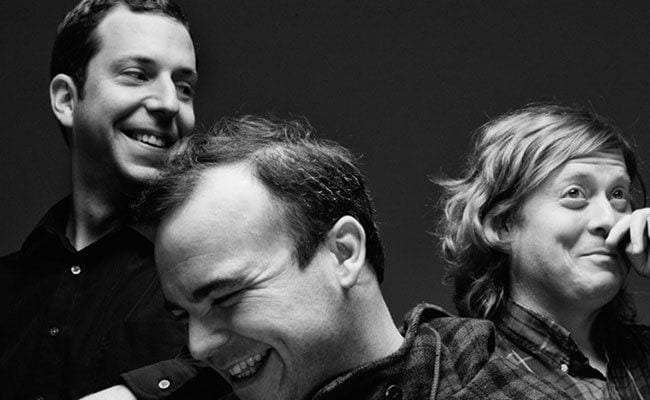
A band that creates a unique or breakthrough sound right out of the gate is a rare and wonderful thing, but often, what makes that sound so special also traps the performer inside of a self-designed cage. Think of all the jokes about the Ramones or AC/DC having made the same album over and over again. The joke doesn’t change the fact that each made excellent music throughout their careers and that nearly every album they produced had at least one perfect statement of the sound that they created.
Future Islands is a band that can be described in similar ways, their sound so unique to them, even when they call to mind their obvious influences. Their attention-grabbing feature will always be Sam Herring’s voice, which soars and croaks in the service of an always theatrical delivery. Herring sings with his whole body, as anyone who has seen the band live can attest: he will beat himself up in both lyric and performance. But the Future Island sound is defined by the interplay between Gerrit Welmers’ symphonic washes of keyboards and William Cashion’s tireless dance-beat bass playing, which draws direct comparison to Peter Hook, another master of the bass guitar as lead instrument. Together, these three musicians have made some of the best dance-oriented singles of the decade.
Herring’s lyrics have always followed the soul-laid-bare school of songwriting. He is fearless in exposing his feelings in song, even when those feelings stray into the mundane. For instance, “North Star” finds Herring stuck at an airport due to a winter storm and unable to uphold his promised meeting with his lover. Unwilling to wait for the weather’s passing, he contemplates the dangerous drive that lies ahead, singing “Freezing rain can’t keep me away from your door”. As pop-song inspiration goes, it falls a bit short of “I would walk 500 miles, etc.”, but it is endearing nonetheless in its honesty. Herring’s songwriting brings weight to the airiness of our internal dialogues. Even our most pedestrian thoughts do not lack in sincerity, and Herring has an innate ability to harness this truth and turn it into a twisted sort of beauty.
A similar plainspokenness guides “Cave”, with Herring’s declaration that “I don’t believe anymore… that you don’t grieve anymore”. Meanwhile, Herring’s sincerity pulls at the heartstrings in “Through the Roses”, a conversational narrative that finds a son saying goodbye to his parents to make his way into the world, “It’s not easy just being human”, he sings, admitting “I’m scared I won’t know what to do / I’m scared that I won’t pull through”. The directness of the lines and the singer’s delivery create an impact that reaching for an overwrought poetic image would dull. Then there’s “Ran”, this album’s contribution to Future Island’s high batting average for strong singles.
Future Islands will probably always be most successful as a singles band because when they work their formula to its best effect, the results cross into the sublime. Since 2010 they have created a collection of arguably classic singles: “Tin Man” and “An Apology” from In Evening Air, “Balance” and “Before the Bridge” from On the Water, “A Dream of You” and, their masterpiece, “Seasons (Waiting on You)” from their 4AD debut Singles. The downside is that it’s hard to maintain such peak performance over the course of a whole record. Future Islands have never released a weak album; it’s just that their peaks are so high that the hills can look like valleys.
Often in the right hands, the self-imposed limitations of a strict framework offer unexpected discoveries or amplify an artist’s creativity. By confining themselves within the framework they have created, Future Islands have created an instantly recognizable, defining sound through which they can still forge surprises. The Far Field is so cohesive and well-played throughout that the boundaries are invisible.


